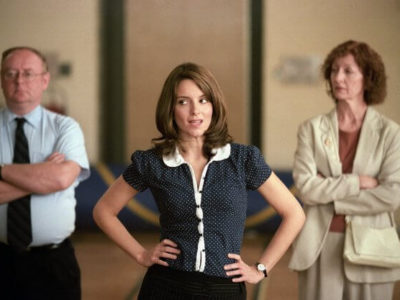There she is, amidst a sea of potato chips and produce, my 10th grade math teacher. I try to dodge the bullet and run to the next aisle, hoping to avoid some inevitably awkward eye contact. While my body scrambles for a hiding place, my brain questions why in the world she’s at the grocery store? She’s a math teacher; she doesn’t need to buy food. I conclude that she must be here counting watermelons and apples for some ridiculous word problem that will be on our test on Monday.
But it’s too late; my miniature legs have moved only inches when I’m spotted. With no escape but into the freezer with Ben and Jerry, I submit to defeat and approach her with as much surprise as I can forge. Small talk and some math questions later, I’m free. Though our conversation flowed smoothly, I have no doubt that class will be awkward on Monday.
We’ve all had one before–the dreaded out-of-school teacher sighting. As masters of the classroom, teachers basically run the world (academically-speaking). So how am I to recognize my chemistry professor at Costco without her handy-dandy periodic table? Or my Spanish teacher at Superfresh, speaking to the cashier in a perfect American accent? It’s difficult to separate my professors from their professions and even consider them living, breathing human beings.
7:30 a.m: I arrive at Starbucks. On the brutally painful trek to the on-campus café, I consider how bizarre it is that my professor has selected a coffee shop for our interview. She’s a communications professor; she doesn’t need caffeine to speak publicly about public speaking for 75 minutes at 8 a.m. I conclude she must either really like the taste of coffee (which would be incredibly impressive), or she loves the little burn bumps you get on your tongue from sipping prematurely. Professor Jaclyn Bruner greets me with a smile.
Across a mildly damp and incredibly small table, we discuss her enjoyment for reading, adventuring and trying new things. Who would’ve thought that a professor reads something other than a four to five page essay? She tells me about her passion for quilting, crocheting, knitting and making things. That’s news to me considering all I thought she did was make quizzes for us to fail. She mentions her love for trying new foods, leaving me again to query these obscure coffee-drinking AND eating habits.
Bruner confirms some of my theory, assuring me that a lot of her life is consumed by teaching and grading. However, she confuses me again, explaining that she likes to do things that she enjoys. Does that mean she doesn’t enjoy listening to 20 undergrads give speeches about Chipotle and karate? A self-proclaimed student-driven teacher, Bruner aims to help her students connect the dots by having confidence in them. Who would’ve thought a professor actually cares about her students beyond lowering their GPA and getting money? To my surprise, Bruner has finished her coffee and is still smiling; she must be a superhero.
Lost in a maze (better known as the history building at the University of Maryland) and several hours later, I am in the office of my U.S. history professor. With walls plastered in maps and abstract art, assumedly created by his daughter, Professor Robert Chiles’ office resembles both a kindergarten classroom and a sophisticated library.
I wouldn’t consider our conversation an interrogation, but Chiles’ immediate “mercy” after each question confirmed my assumption that he’d never been asked questions of this magnitude. With a vibrant passion for history, Chiles admits that he’s constantly trying to see the human side of life as he does with history, and not live in a world of theories. Having completely ostracized himself from the virtual invasion of technology, Chiles emulates his love for the past by displaying his sleek and sophisticated flip phone.
Despite his efforts to stay as connected to history as possible, Professor Chiles certainly has one-upped the Neanderthals with his flip phone considering they didn’t even have the luxury of toilet paper. Attributing much of his “engaged and compassionate” character to his family, Chiles chuckles as he admits his hopes of being considered a good dad. I’m shocked–not only does he have a life that isn’t entirely focused on the past, but he also has a family. This man must be some mortal form of the Greek gods.
Maybe, it’s the whole “respect your elders” notion, or maybe it’s the fact that they are willingly staying in school that leads us to see our professors as an alternate species. However, after careful speculation and extensive research, I can now confirm that they not only breathe, but professors eat, read, drink coffee, buy groceries and use oh-so-sacred cell phones.
Let’s just hope we don’t wake up tomorrow morning with an Instagram request from our biology professors. I think I would much rather endure another grocery store encounter than receive an ‘F’ for rejecting my professors follow request.



















